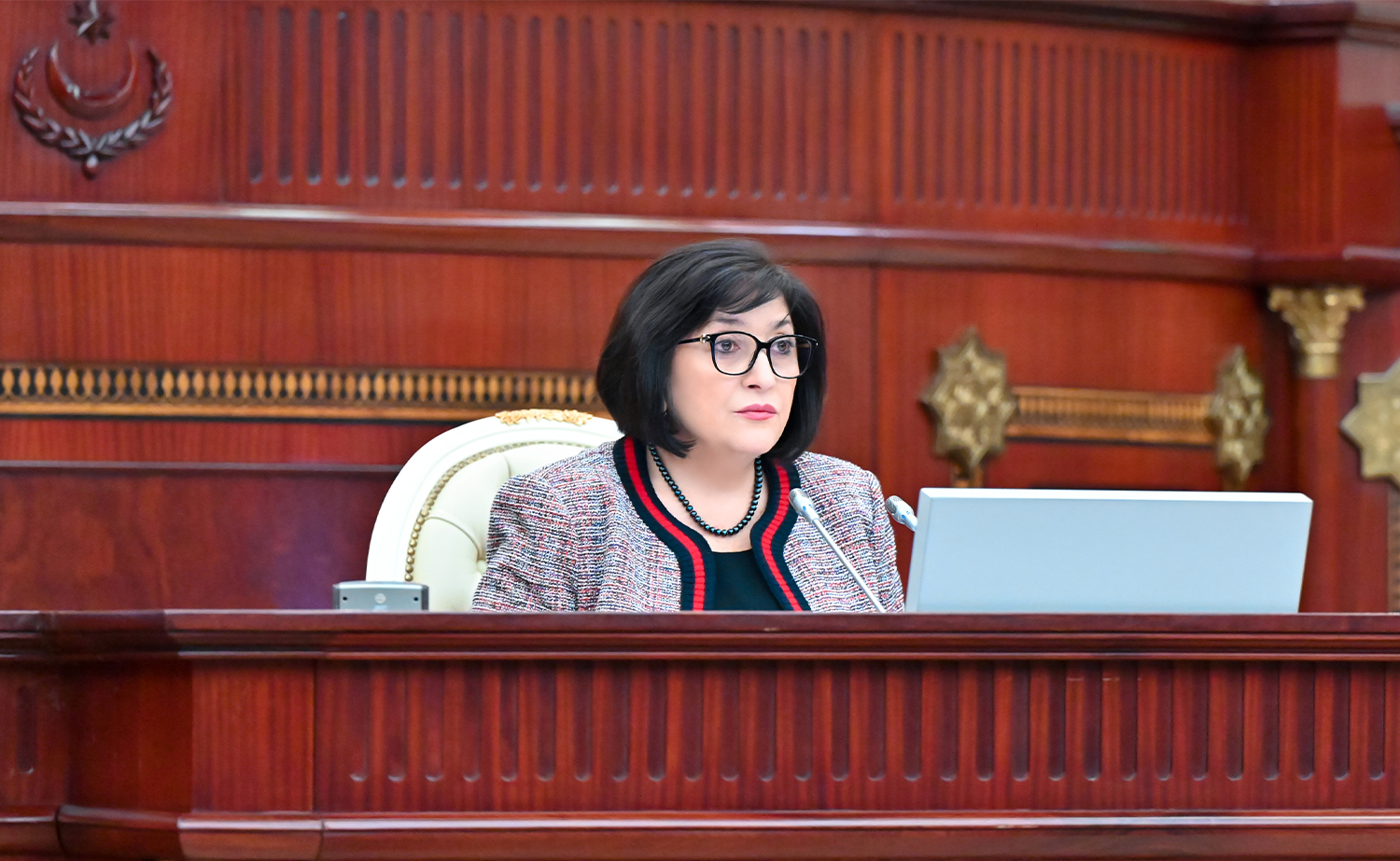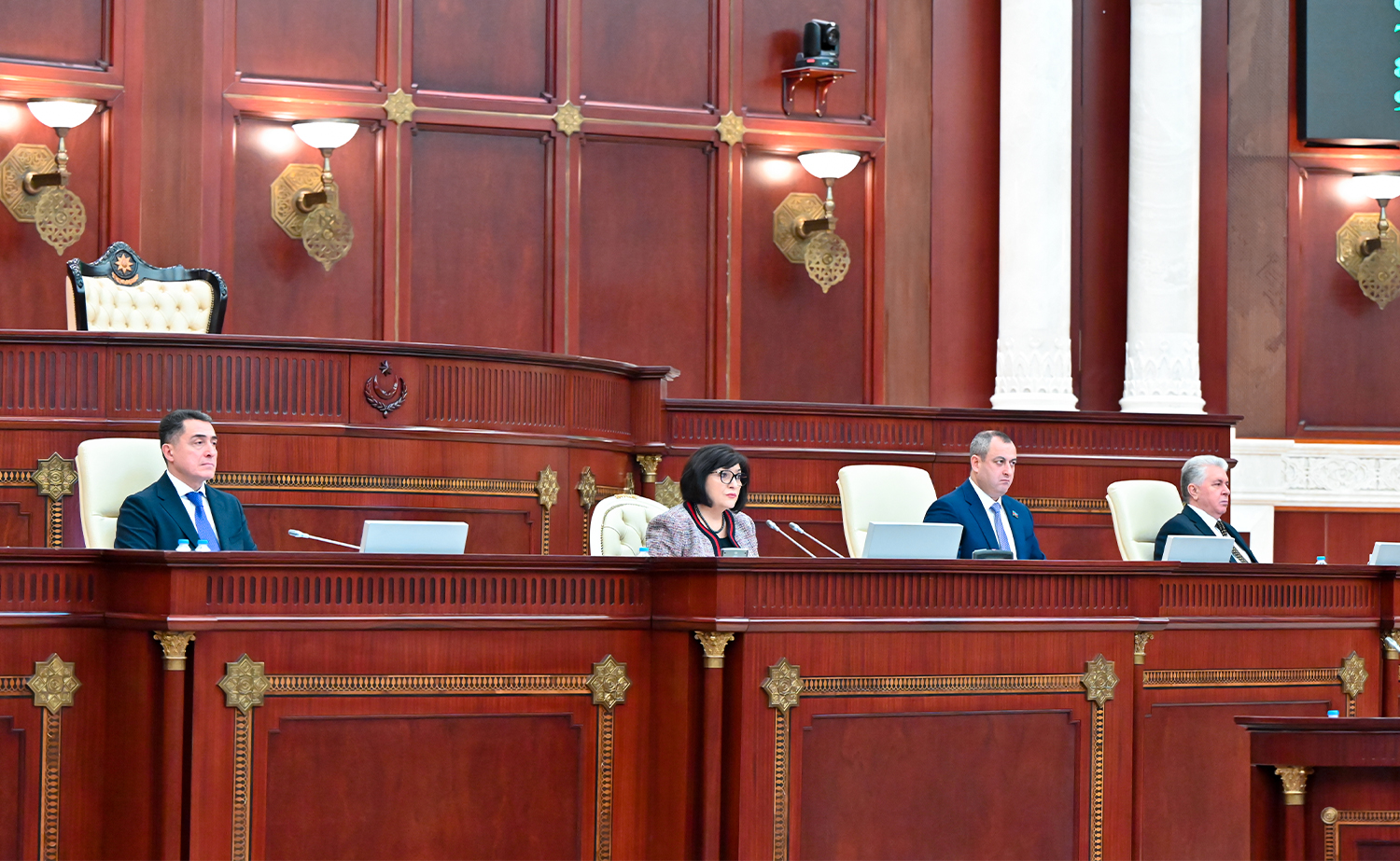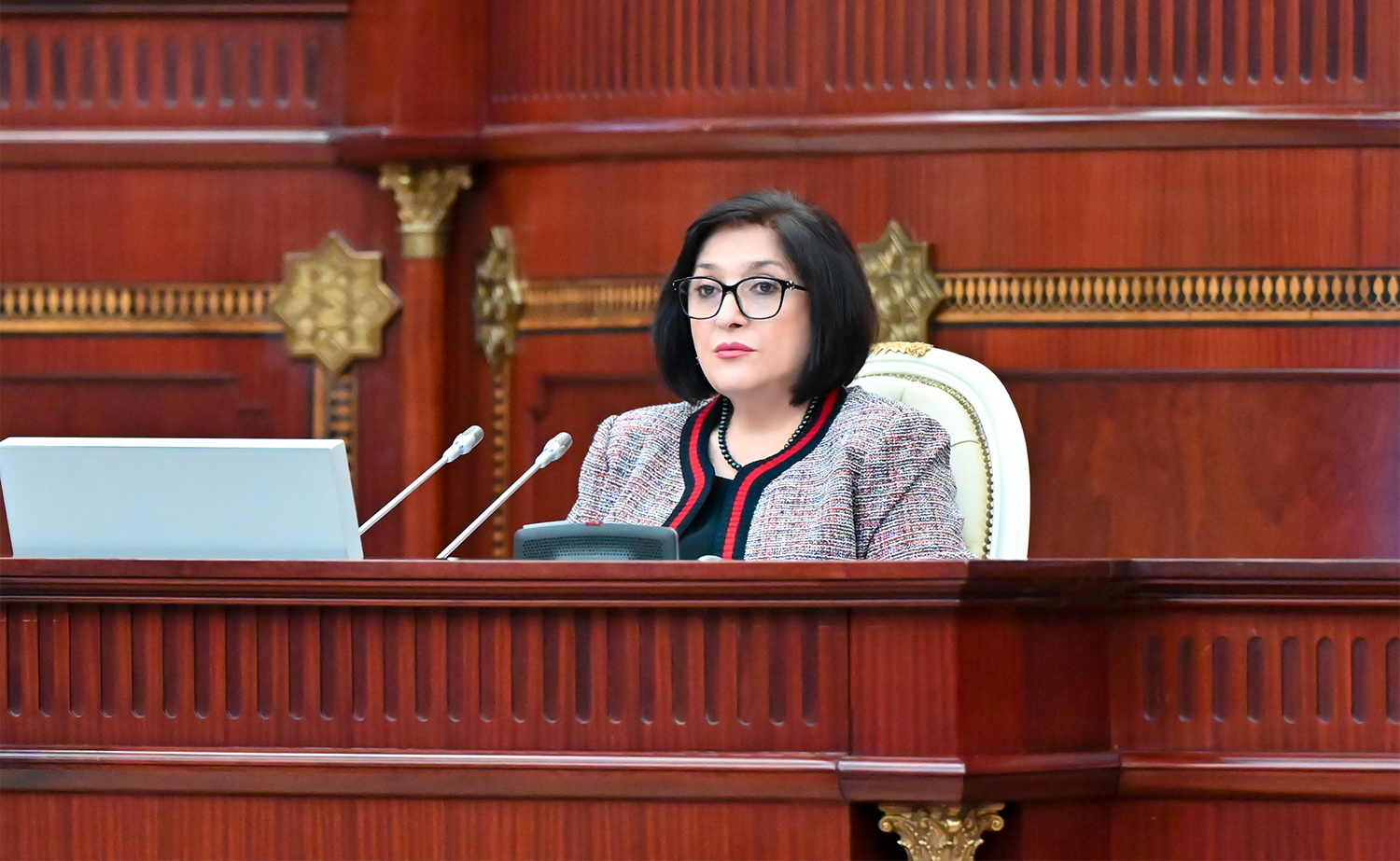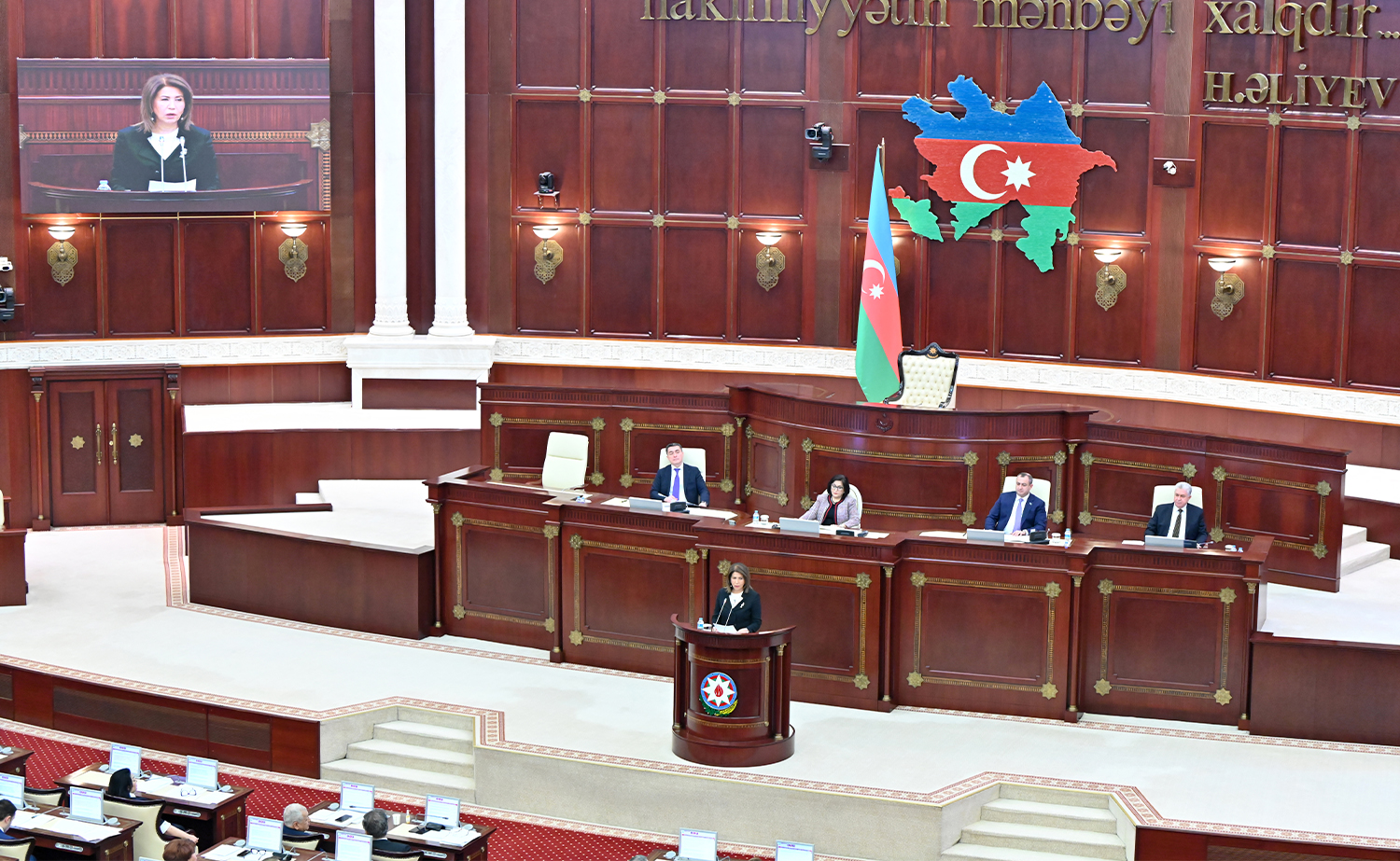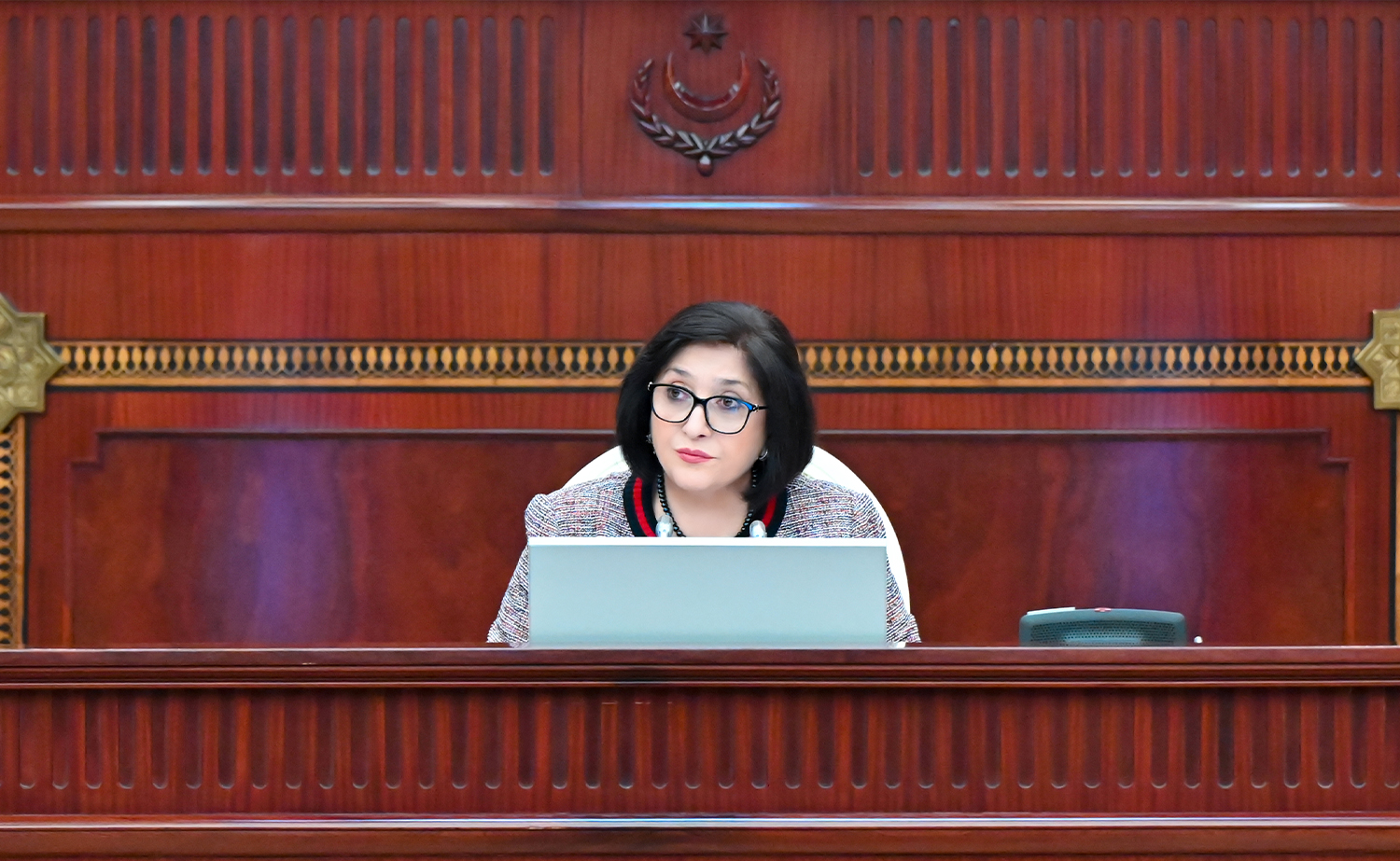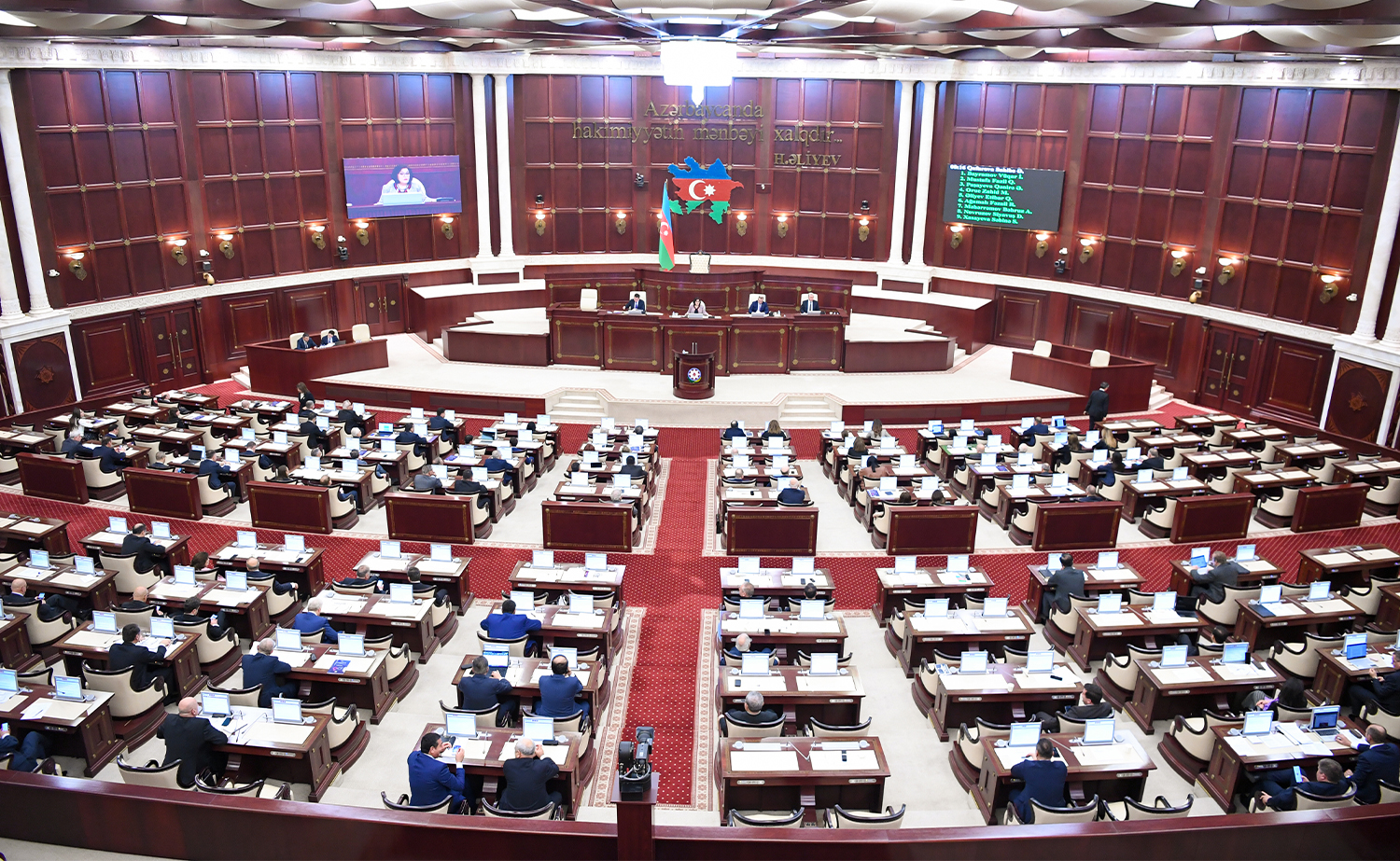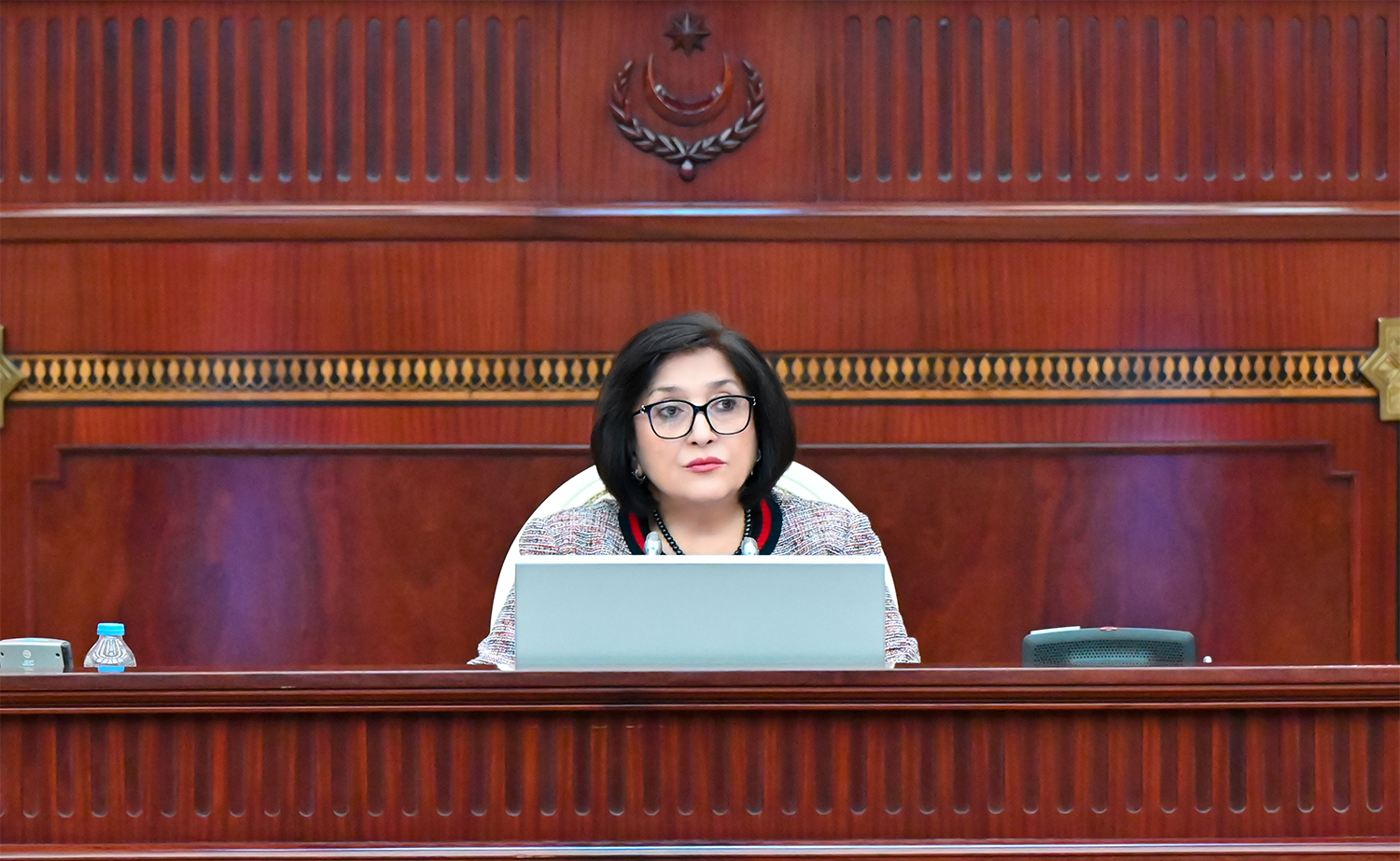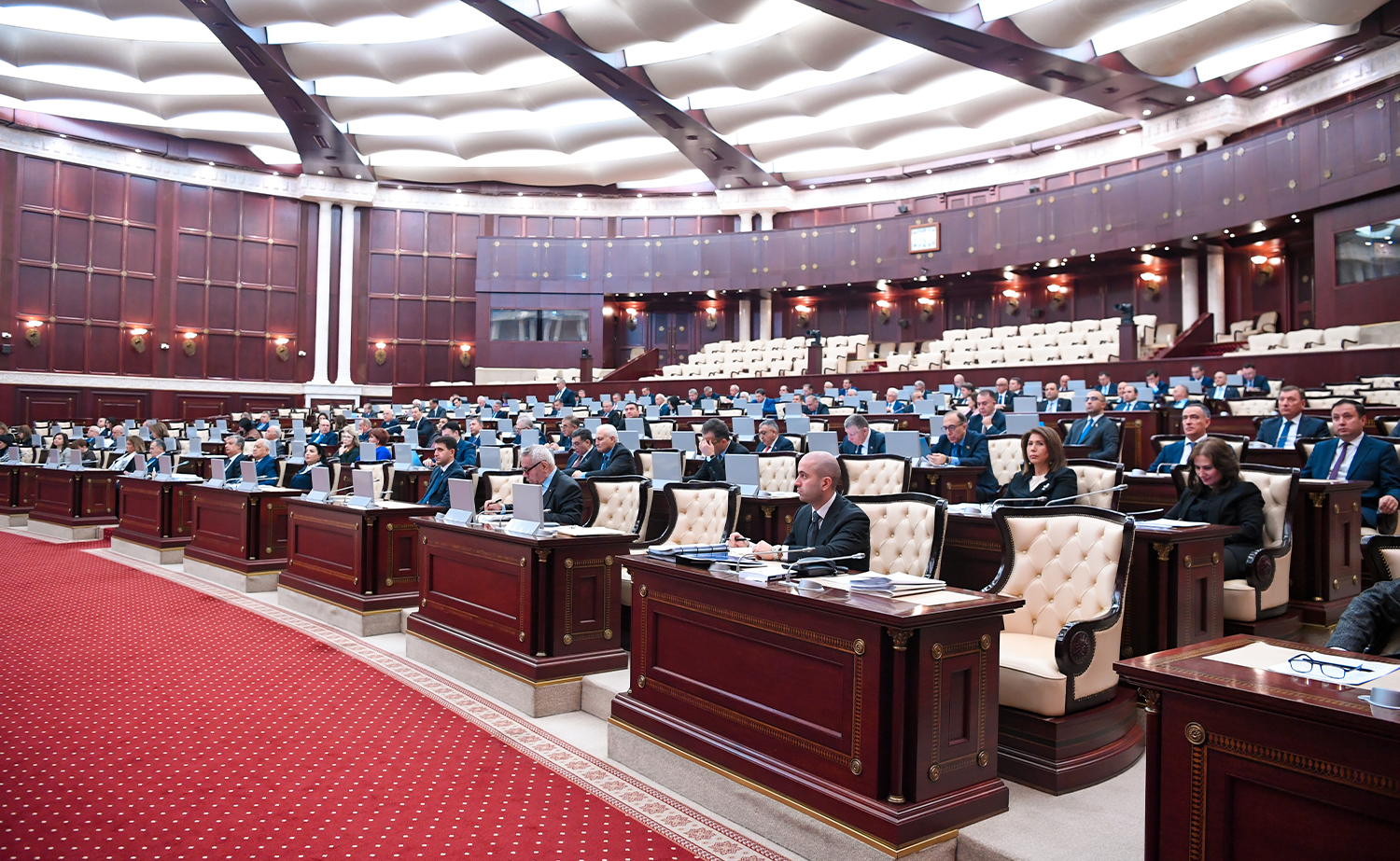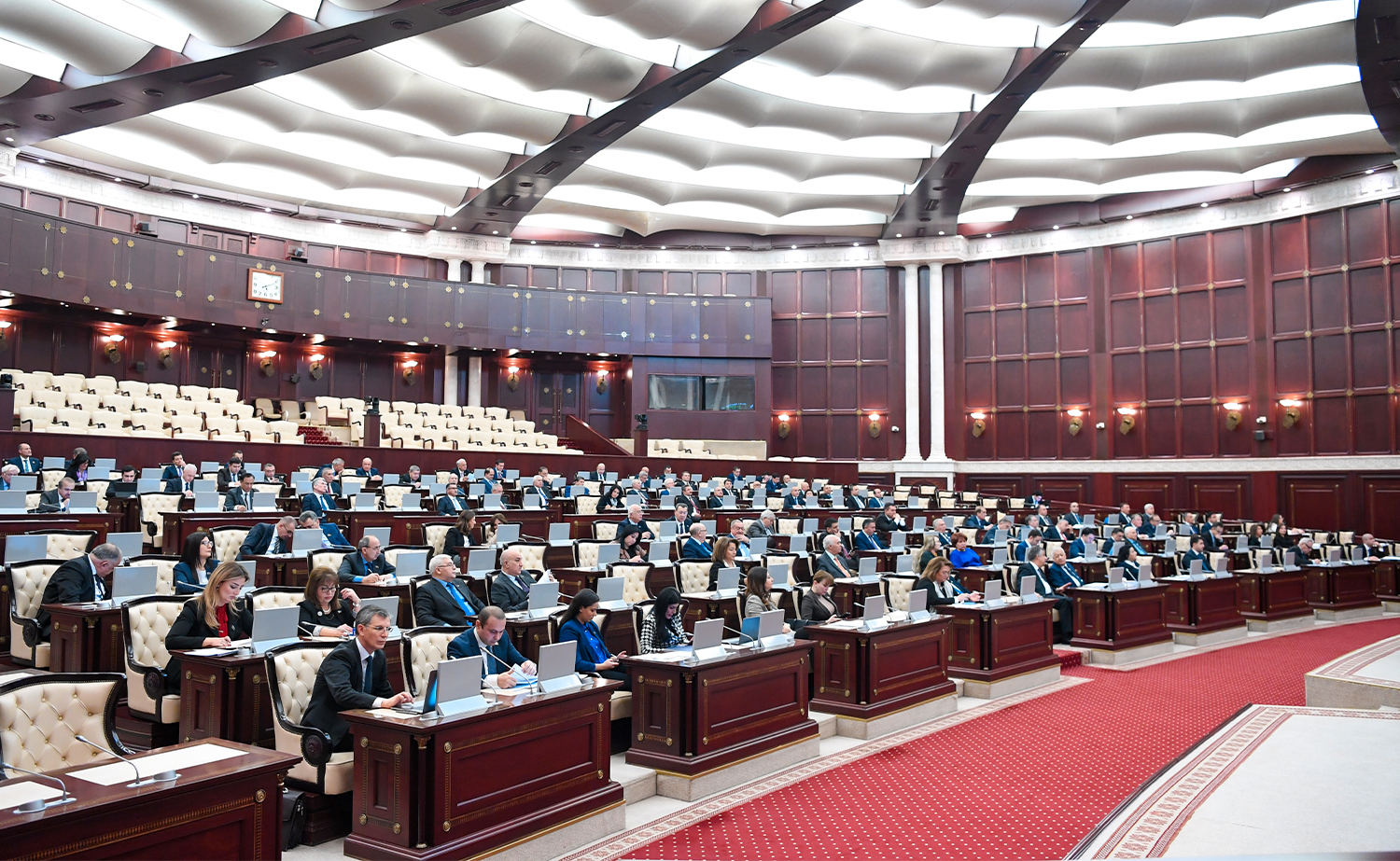At the Plenum of the Milli Majlis
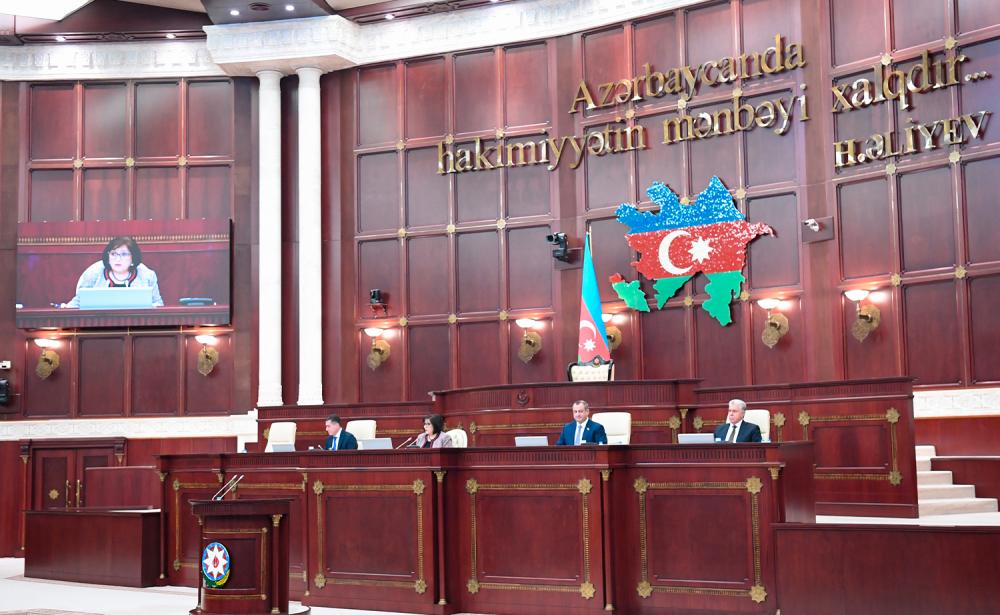
The Milli Majlis met in plenary as scheduled under the chairmanship of Speaker Sahiba Gafarova on 20 December.
The discussion revolving round issues du jour included commentaries by the parliamentary committee chairman Samad Seyidov and the MPs Musa Gasimli, Azay Guliyev, Mahir Abbaszade, Sahib Aliyev, Elman Nasirov, Kamal Jafarov, Vahid Ahmadov, Jala Aliyeva and Tural Ganjaliyev. They touched on the developments on Corsica and spoke of France’s breaking democratic norms, human rights and supremacy of law in that French province as well as they brought up the violence to which French law enforcers had subjected the local population. Besides, the MPs had in their crosshairs France’s backing to the Armenian separatism in Azerbaijan’s Garabagh Region – the backing that is in stark contrast to the criminal tackling of people living in the French territory. This matter must be raised with all the international organisations but, first of all, the UN; the broad international public should be made aware of it; the French repressions against the people of Corsica had to end, the Azerbaijani lawmakers were saying.
Azerbaijan is being treated in a double-standard way, biased claims are put to the country and yet, today’s strong Azerbaijan freed her lands from occupation and is busy reviving them now, they continued. At the same time, the provisions of the Trilateral Statement signed after Azerbaijan’s victory in the 44-day Patriotic War are not being carried out. The armed forces of Armenia have not been withdrawn yet from the territory of Garabagh where military provocations have been committed and where the communication lines are being kept from reopening. The illegal exploitation of Azerbaijan’s mineral resources located in Garabagh, the environmental damage dealt and other similar facts are to be regarded as the economic crimes against our country being continued, in the opinion of the legislators.
The MPs praised the visit President Ilham Aliyev of Azerbaijan had paid to Turkmenistan a few days back as well as they did the recent – and the first one – summit meeting of the leaders of the Republic of Azerbaijan, the Republic of Türkiye and Turkmenistan, the discussions held at it and the important documents inked during it. At the same time, they emphasised the significance of the inter-governmental agreement between Azerbaijan, Georgia, Romania and Hungary concerning strategic partnership for the development and transfer of green energy, and signed during the visit of the head of Azerbaijan to Romania.
Sahiba Gafarova then announced that there were 60 items on the agenda and with the first of those concerning the annual information summary of the gender equality oversight executive body.
The summary was presented by Chair of the State Committee for Family, Women’s and Children’s Problems Bahar Muradova who told the House that the past year had gone down in the country’s history as one during which comprehensive restoration and revival had been started following our nation’s historic victory in the Patriotic War. The implementation of the large projects encompassed by the Great Return state programme are going to bring about accelerated resurrection of the economic regions of Garabagh and East Zangazur whilst also ensuring the re-rooting of the local population and their sustained economic activity, according to Mrs Muradova. The planned emergence of the Lachin Community Resource Centre and of the family centres in Fuzuli and Zanghilan guarantee that the compatriots due to go back to the respective provinces will be taken care of as they should.
The 2022 conclusions that the UN Committee on the Elimination of Discrimination against Women released with regards to the Azerbaijani Government’s 6th periodical report highlight a progress in streamlining the national legislation and promoting gender equality in our country, said the chair of the State Committee. In addition, one of the proposals that the State Committee put forward in 2021 was about defining the unpaid paternity leave right. Another matter had to do with revising the list of jobs closed for women and aligning the relevant norms with the international documents; the Labour Code was then amended appropriately.
Bahar Muradova told the participants of the plenum that important steps had been taken during 2021 to develop the toolkit and mechanisms required to maintain gender equality in Azerbaijan. Also that year, a new building of the Ismayilli Children and Family Support Centre was inaugurated with the participation of President Ilham Aliyev and First Vice President Mehriban Aliyeva.
During the reporting period saw the work of those responsible for gender issues get diversified; the latter organised co-operation with international structures, considered methods to combat gender discrimination and organised training courses and awareness-raising efforts covering various topics. Various thematic trainings for representatives of the gender commissions established in municipalities were held in 2021 in order to strengthen women's representation in local elected bodies. The work scopes of the women’s resource centres were broadened, new centres of the kind were installed in the Gioychay and Tovuz provinces and public resource centres emerged in the Fuzuli, Terter and Agjabedi provinces as well last year.
The State Committee spent that period expanding its mass media and ICT exposures and re-launching the Parental Control and Security on the Internet resource. A special ‘Home Violence’ was created, and the ‘860’ hotline was added to the State Committee website. What’s more, numerous projects, seminars, training sessions, online meetings and webinars were undertaken together with international and local partners.
The state authorities’ action to avert household violence last year had been in keeping with the National Action Plan, Bahar Muradova remarked before presenting some figures. A household violence victims’ social rehab centre had been started at the Department of Shelters and Social Rehabilitation to boost the opposition to such violence, the State Committee chair remarked before outlining the arrangements made to discourage evasion of studies and stressing the importance of the gender choice.
There are positive and sustainable gender equality trends in the legislative, executive, law-enforcement, social, diplomatic, agrarian, economic and other areas, Mrs Muradova went on. It follows from the review provided by the State Examinations Centre that women candidates fare well looking at the age-group breakdown of those pass their admission exams. The interviews held to shed more light on that situation indicated that the age group 18-24 of successful candidates given their postings was female predominantly. This means the increased interest of female graduates or senior students in the Civil Service – as much as it shows that men enjoy equal rights. On the whole, the results are indicative of the increasing women’s participation in state administration and state-level decision-making compared with previous years.
Bahar Muradova also talked about gender equality as a prerequisite for sustainable development, saying that men prevailed over women quantitatively within the economically active portion of the population in 2021, and that women’s and men’s unemployment levels made 58% and 42% respectively last year. Reference was made to the narrowing of the gap between the average monthly wages paid to women and men and, in general, to progress in this area. Voicing the numbers reflecting the gender breakdown of entrepreneurs in different business sectors, Mrs Muradova said that women dominated the academic and education systems; she commended on women’s active engagement on all the systems of the national education system alongside men.
The approach to the obligations put on political parties, NGOs and trade unions is one of the factors influencing the way in which the state gender equality agenda performs; meanwhile, the Political Parties Bill that the parliament passed into law earlier this year will make certain that women are involved in the country’s political life yet more actively, according to Mrs Muradova.
Analysis of the data for 2021 suggests that positive trends in gender equality have begun to emerge in Azerbaijan, in some cases even outpacing global indicators. Measures need to be implemented to address the existing gaps and international commitments of the country in order to give impetus to the gender equality dynamics, Ms Muradova noted before stating her proposals in this regard.
When Mrs Muradova was done with her presentation, chair of the parliamentary Family, Women’s and Children’s Affairs Committee Hijran Huseynova said that the information as presented was extensive and all-encompassing. In her opinion, the projects and undertakings aiming to secure equal involvement of women and men in various processes and to promote gender culture as well as to discourage gender and household violence again demonstrate the annual progress in maintaining gender equality in the country.
The analytical data tabled manifest a dynamics of women’s and men’s representation in diverse fields and, what’s more, our country is ahead of several world-wide indications. On the other hand, there are still concerns such as early marriages and gender discrimination of newborns. Steps must be taken in their regard, in the opinion or Mrs Huseynova.
Several regulatory acts have been passed; action plans have been approved. For instance, one could mention the amendments to the Labour Pensions and the Social Benefits laws – those factors in gender equality maintenance importantly. As for the amendments to the Labour Code, they shortened from 674 to 204 the list of occupations and positions from which women are barred legislatively. There are also legislative amendments motioned to make the 14-day unpaid parental leaves paid ones.
Mrs Huseynova commended the State Committee on its Children and Family Support Centres helping people up country and talked about the importance of co-operation amongst the specialist state departments in this matter. It is as important that the pertaining executive mechanisms are improved more.
The annual report reflects the achievements made in gender equality maintenance and sets the tasks to be addressed yet. The document had been discussed at a meeting of the Family, Women’s and Children’s Affairs Committee and been recommended for tabling at a plenum of the Milli Majlis, Mrs Huseynova concluded.
Deliberations followed. The committee heads Ganira Pashayeva and Zahid Oruj and the MPs Vugar Bayramov, Aydin Mirzazade, Fazil Mustafa, Etibar Aliyev and Fazail Agamali commented on the annual report and made proposals and remarks of their own. Chair of the State Committee Bahar Muradova replied to their comments and answered the questions asked.
Speaker Sahiba Gafarova underlined the high quality of the report and wished the State Committee further achievements.
The House noted the State Committee’s annual report in the end.
Mrs Gafarova said then that the next 48 agenda items were draft laws in the third reading and that Item 2 was a set of amendments to the Law ‘On the Institution of the Orders and Medals of the Azerbaijan Republic’ in view of the introduction of the medals ‘The Tenth Anniversary (xxxx) of the State Agency of Citizen Services and Social Innovations under the auspices of the President of the Republic of Azerbaijan’ and ‘For Effective Co-operation with the ASAN Service’.
As he was tabling the relevant Bill, Nurlan Hasanov of the Law Policy and State-Building Committee said there had been no remarks or suggestions regarding it during either the 1st or the 2nd reading. Both medals were to mark the tenth anniversary of the ASAN Service, he added.
The Bill was approved in the third reading.
Sahiba Gafarova remarked that the next 47 items had arrived at the Milli Majlis from the President of the Republic in one package and were interrelated topically in that they had been drawn up in line with the 2020-2022 National Open Government Development Action Plan and intended to broaden the e-services more and to enhance the levels of public contentedness with those. Nine Milli Majlis committees had scrutinised those draft laws.
That introduction was followed by presentations given by the corresponding parliamentary committees.
Azer Badamov of the Committee for Public Associations and Religious Entities came up with an overview of amendments to the Freedom of Faith Law and said that there had been no remarks or proposals about it.
Chairman of the Economic Policy, Industries and Enterprising Committee Tahir Mirkishili tabled the Items 4th to the 21st. Those were amendments to the laws ‘On the Privatisation of the Housing Stock’, ‘On Currency Regulation’, ‘On Financial and Industrial Groups’ and ‘On Trademarks and Geographical Indications’, to the Customs Authorities Service Charter enacted by the Law of the Azerbaijan Republic No 768-IQ dated 7 December 1999, the Motoring Roads Law, the Tax Code and the laws ‘On Banks’, ‘On Lotteries’, ‘On the State Register of Real Estate’, ‘On Mortgage’, ‘On the Deposits Insurance’, ‘On the State Debt’, ‘On the Insurance Practice’, ‘On Non-Bank Credit Organisations’, ‘On Investment Funds’, ‘On the Securities Market’ and ‘On Licences and Permits’.
Tahir Mirkishili told the House that those drafts dealt with obtaining, via electronic information systems, the documents required in state-civil and state-business relations. No comments or suggestions were made during the first and second readings of the amendments.
Member of the Law Policy and State-Building Committee Kamal Jafarov then tabled the next sixteen items on the agenda beginning with Item 22. Those were sets of amendments to the laws ‘On the Identification Card of the Citizen of the Republic of Azerbaijan’, ‘On Passports’, ‘‘On the Registration at the Place of Residence and Abode’ and ‘On the Status of the Member of the Milli Majlis of the Republic of Azerbaijan’, to The Regulation on the Special Documents for the Apatrides Permanently Residing in the Republic of Azerbaijan’, affirmed with the law No 421-IQ dated 30 December 1997, to the laws ‘On Traffic’ and the Regulations on Enforcing the Law ‘On the Compulsory State Insurance of Employees of Courts of Law and the Law Enforcement Authorities’, itself enacted pursuant to the law of the Republic of Azerbaijan No 773 dated 8 December 1999, the Azerbaijan Republic Internal Affairs Authorities Service Charter enacted with the Law of the Azerbaijan Republic No 168-IIQ dated 29 June 2001 and the laws ‘On the State Registration and State Register of Legal Entities’, ‘On Administrative Proceedings’, ‘On the State Register of Population of the Republic of Azerbaijan’ and, further, the Regulation on the Procedure for Issuing Certificates of Return to the Republic of Azerbaijan (enacted with the Law No 267-III dated 10 April 2007) and, lastly, to the Housing, City Planning and Building, and Migration Codes. Again, no comments or suggestions on these amendments were received during the first reading, nor during the second reading, according to MP Jafarov.
Next, Chairman of the Agrarian Policy Committee Tahir Rzayev tabled the agenda Items 38 and 39, to wit, amendments to the law ‘On Achievements of Selection and, separately, to the law ‘On Land Rent’. Here, too, it was said there had been neither remarks nor suggestions concerning those during the first and second readings.
Chairman of the Defence, Security and Anti-Corruption Committee Ziyafet Asgarov then set out the essence of the case for the Items 40 to 42 inclusive, those being separate sets of amendments to the law ‘On the Compulsory State Individual Insurance of Military Personnel’, to ‘On the Military Duty and Service’ and the Military Service Performance Charter (enacted with the law No 377-IQ dated 3 October 1997) and the law ‘On the Military Duty and Service’. The committee he is heading seconded all the three Bills unanimously, Mr Asgarov emphasised.
Fatma Yildirim of the Natural Resources, Energy and Ecology Committee described amendments to the Environmental Protection Law and mentioned the relevant favourable response of that parliamentary committee.
Chair of the Family, Women’s and Children’s Affairs Committee Hijran Huseynova informed her colleagues of amendments to the Family Code, adding that there had been no comments or suggestions in that regard.
Chairman of the Sciences and Education Committee Bakhtiyar Aliyev covered Item 45 – amendments to the E-Signature and E-Document Law – and mentioned the pertaining positive conclusion of his parliamentary committee.
Head of the International and Inter-Parliamentary Relations Committee Samad Seyidov tabled his committee’s supportive opinion statement about draft amendments to the law ‘On the Compulsory State Individual Insurance of the Diplomatic Service Staff Members Stationed at the Diplomatic Missions and Consulates of the Republic of Azerbaijan, and of Persons Providing Administrative Technical Services’.
Vugar Bayramov of the Labour and Social Policy Committee spoke about the Items 47th to the 49th inclusive, and said that the committee he represents had endorsed the amendments to the laws ‘On Retirement Pensions’, ‘On Social Benefits’ and ‘On the Social Service’.
Further, MP Fazail Agamali made some comments, after which all the draft laws brought before the House were voted through the third reading.
Draft laws in the second reading made the following 6 agenda items, according to Sahiba Gafarova who added that three of those were amendments to the Telecommunications Law (Item 50), the Code of Administrative Offences (51) and the Licences and Permits Law (52), and the Milli Majlis had received them from the President of the Republic in one parcel. Those amendments are interrelated topically and they had been considered by two parliamentary committees, Speaker Gafarova said before giving the floor to member of the Economic Policy, Industries and Enterprising Committee Elnur Allahverdiyev who proceeded to introduce Item 50 and Item 52, and to present that committee’s favourable conclusion about Item 51.
According to MP Allahverdiyev, the amendments to the Telecommunications Law envisaged Allocation of time-limited (10 years) radio frequency resources and formulation of the basis for their application.
As regards the Licences and Permits Law, the amendments there would bring a terminological clarification in line with the Telecommunications Law.
Speaker Gafarova told the plenum participants that Deputy Minister for Digital Development and Transport Farid Ahmadov, Head of the Ministry’s Legal Department Elvin Mammadov and Head of the State Radiofrequencies Office under the auspices of the Ministry Ilham Ahadov were present at today’s session in connexion with those amendments.
Item 52, too, had been reviewed by the Law Policy and State-Building Committee, Mrs Gafarova mentioned before passing the floor to that committee’s member Nizami Safarov.
MP Safarov voiced the committee's favourable opinion on Item 51 and said there were no changes to the Bill.
All the three Bills were voted through the 2nd reading one by one after that.
Speaker Gafarova announced that Item 53-1 and Item 54-1, too, had been submitted to the Milli Majlis by the Head of State and, yes, in one parcel and were interconnected again. They were to be tabled together therefore.
Member of the Economic Policy, Industries and Enterprising Committee Elnur Allahverdiyev said about the draft amendments to the Telecommunications Law he was presenting that they defined the legislative basis for registering mobile devices.
As regards amendments to the Code of Administrative Offences, the introducing member of the Law Policy and State-Building Committee Nizami Safarov mentioned the absence of whatever remarks and proposals to that end. The aforementioned Elnur Allahverdiyev voiced the relevant favourable conclusion made by the Economic Policy, Industries and Enterprising Committee.
Both Bills were put on vote and approved in the second reading.
Item 55 of the agenda dealt with amendments to the Labour, Family, Criminal and Criminal Procedural Codes and to the laws ‘On the Rights of the Child’, ‘On Lawyers and the Bar Practice’, ‘On Education’, ‘On the Social Service’, ‘On the State Dactyloscopic and Genome Registration in the Republic of Azerbaijan’ and ‘On General Education’. The accompanying advisory came from Jala Aliyeva of the Labour and Social Policy Committee. Here, too, it was said that there had been no corrective remarks or proposals regarding the Bill, which MP Aliyeva suggested should be voted upon therefore.
Chair of the Family, Women’s and Children’s Affairs Committee Hijran Huseynova, member Of the Law Policy and State-Building Committee Amina Agazade, chairman of the Human Rights Committee Zahid Oruj and chairman of the Sciences and Education Committee Bakhtiyar Aliyev tabled the favourable responses of the corresponding parliamentary committees.
The Bills were all approved in the second reading.
Finished with the 2nd-reading Bills thus, as the Speaker of the Milli Majlis duly announced, the House moved on to the last five items, which were another set of draft laws. The first four of us had been received from the President of the Republic in one parcel, and were interconnected substance-wise, again, according to Sahiba Gafarova who said that their purpose was to regulate ICT matters. Those were first-reading amendments to the Tax Code, to the Customs Tariff Law and to the Social Insurance Law. Three committees of the Milli Majlis had examined them, Mrs Gafarova remarked before suggesting that the committees’ opinions should be heard together.
Chairman of the Economic Policy, Industries and Enterprising Committee Tahir Mirkishili said as he was giving an overview that the documents submitted to the Parliament by way of the President’s legislative initiative were poised to turn a leaf in the progress of the ICT in Azerbaijan. Mr Mirkishili mentioned the intensive state care of this area before referring to acute competition for ICT specialists, be it in the world or in our region. Programmed incentives and perks in use in this sector world-wide of late bear on Azerbaijan unavoidable; so the Bills envisage development of the sector, support to specialist legal and physical entities actually engaged in it, promotion of digital growth in the country and attraction of overseas investments as well as of highly qualified specialists and industry workers. Mr Mirkishili also outlined the significant tax, social and migration benefits envisaged by the amendments for a period of 10 years from 1 January 2023.
IT enterprises operating outside technology parks will also be considered park residents. Resident entrepreneurs active in the fields of systems integration, software development, support and training will be fully exempt from income tax (20%) and income tax (14%). The tax on dividends (10%) withheld at source of profit distribution will be cancelled for such enterprises, besides. What is more, hired workers, overseas nationals and apatrides whom such companies take on are to be exempted from the income tax and compulsory social insurance contributions as well.
The Bill containing amendments to the Migration Code had also been considered by the Law Policy and State-Building Committee, Speaker Gafarova said as she ceded the floor to that committee’s head (and First Vice Speaker) Ali Huseynli.
Mr Huseynli said then that the draft was related to exempting overseas nationals or stateless persons from the obligation to obtain work permits regarding their employment by local IT companies, and that the Law Policy and State Building Committee had given a favourable opinion on the document.
Deputy Chair of the Labour and Social Policy Committee Malahat Ibrahimghizi let the House hear the committee’s positive response to the amendments to the Social Insurance Law.
She told the colleagues and other participants of the plenum that the draft had been drawn up to ensure progress in information and communication technology technical parks with reliance on modern scientific and technological achievements, to attract highly qualified specialists and staff, and to provide benefits for the payment of mandatory state social insurance contributions. The latter is anticipated to bring about an influx of new businesses and highly skilled professionals into the field. Regarding the substance of the amendments to individual articles of the law in question, Mrs Ibrahimghizi said employees hired by a technical park resident would be able to pay mandatory state social insurance contributions, at their option, either from four times the minimum monthly salary or from the income from wage labour – it so follows from new Article 14.8 proposed to be added to the Insurance Law.
The MPs Nigyar Arpadarai, Elshad Mirbashir oghlu, Etibar Aliyev, Razi Nurullayev, Gudrat Hasanguliyev and Rufat Guliyev commented on the Bills and Tahir Mirkishili responded to their remarks and proposals.
The Speaker of the Milli Majlis suggested that Deputy Minister for Digital Development and Transport Farid Ahmadov who was present at the plenum that he should perhaps consider MP’s questions in the routine order.
Then, the Bills were voted through the first reading one by one.
And the last item on the agenda of the sitting was about the introduction of amendments (in the first reading) to the Law ‘On the Orders and Medals of the Republic of Azerbaijan’ in connexion with the establishment of a new jubilee medal ‘The Centenary (1923-2023) of the Supreme Court of Azerbaijan’.
This matter was covered by chairman of the Law Policy and State-Building Committee Ali Huseynli who talked of the history of drafting the regulations of the Supreme Court and inception of the Supreme Court of Azerbaijan. He said also that the Bill met all the legislative requirements. A comment by MP Tahir Karimli and a response to it by Deputy Speaker Ali Huseynli followed in the course of the debate that followed; then, the Bill was passed by a first reading vote.
And the plenary sitting of the Milli Majlis was over.
The Press and Public Relations Department
The Milli Majlis



